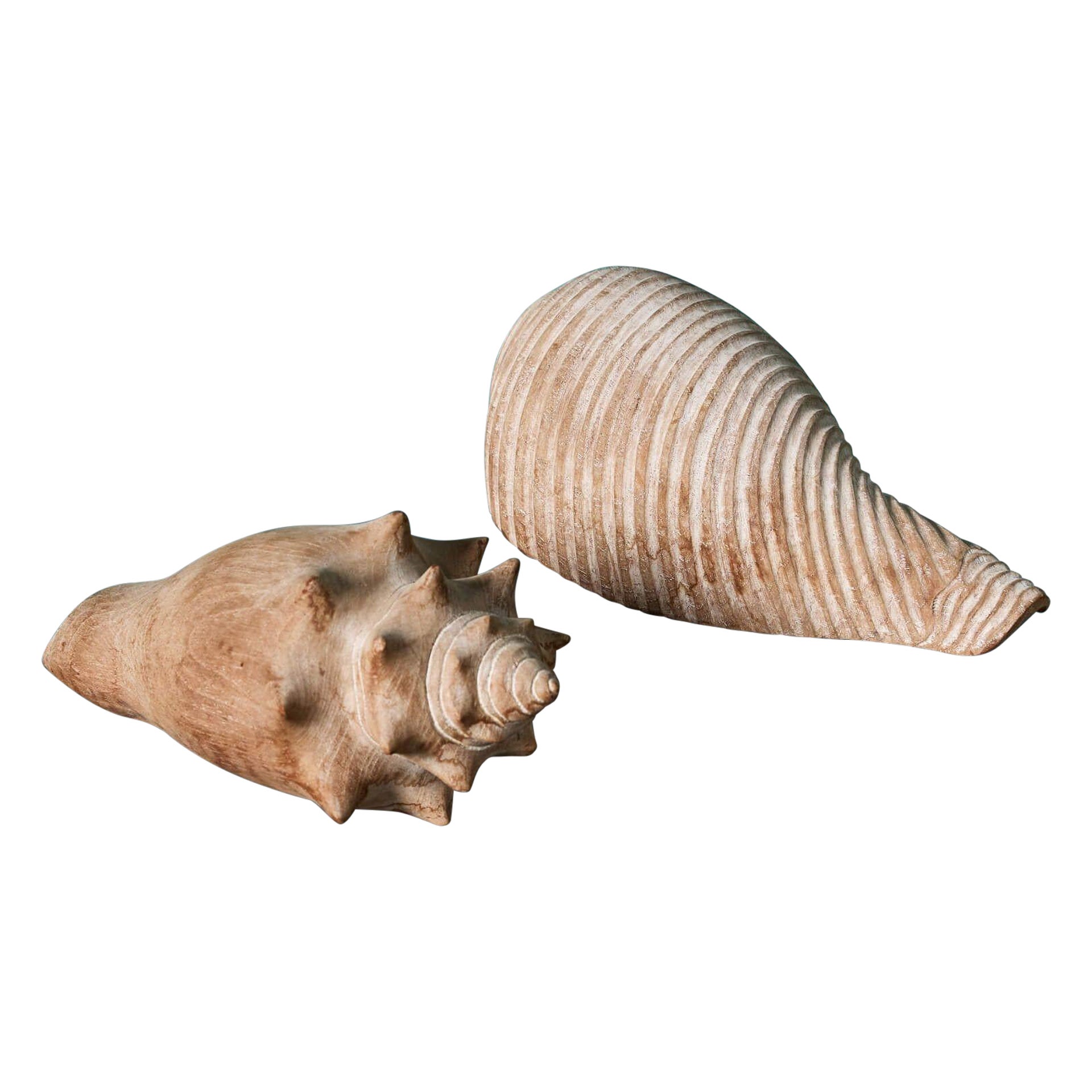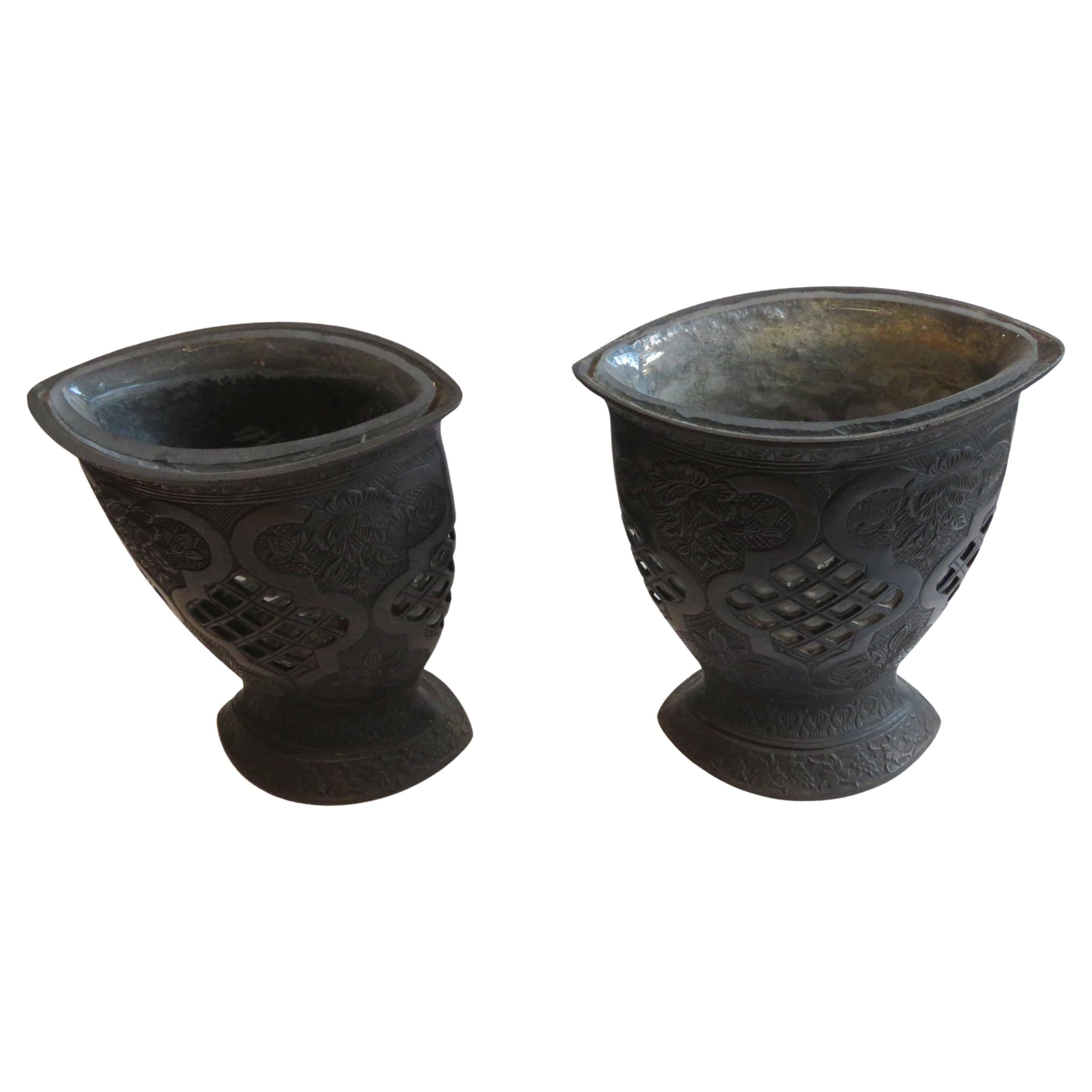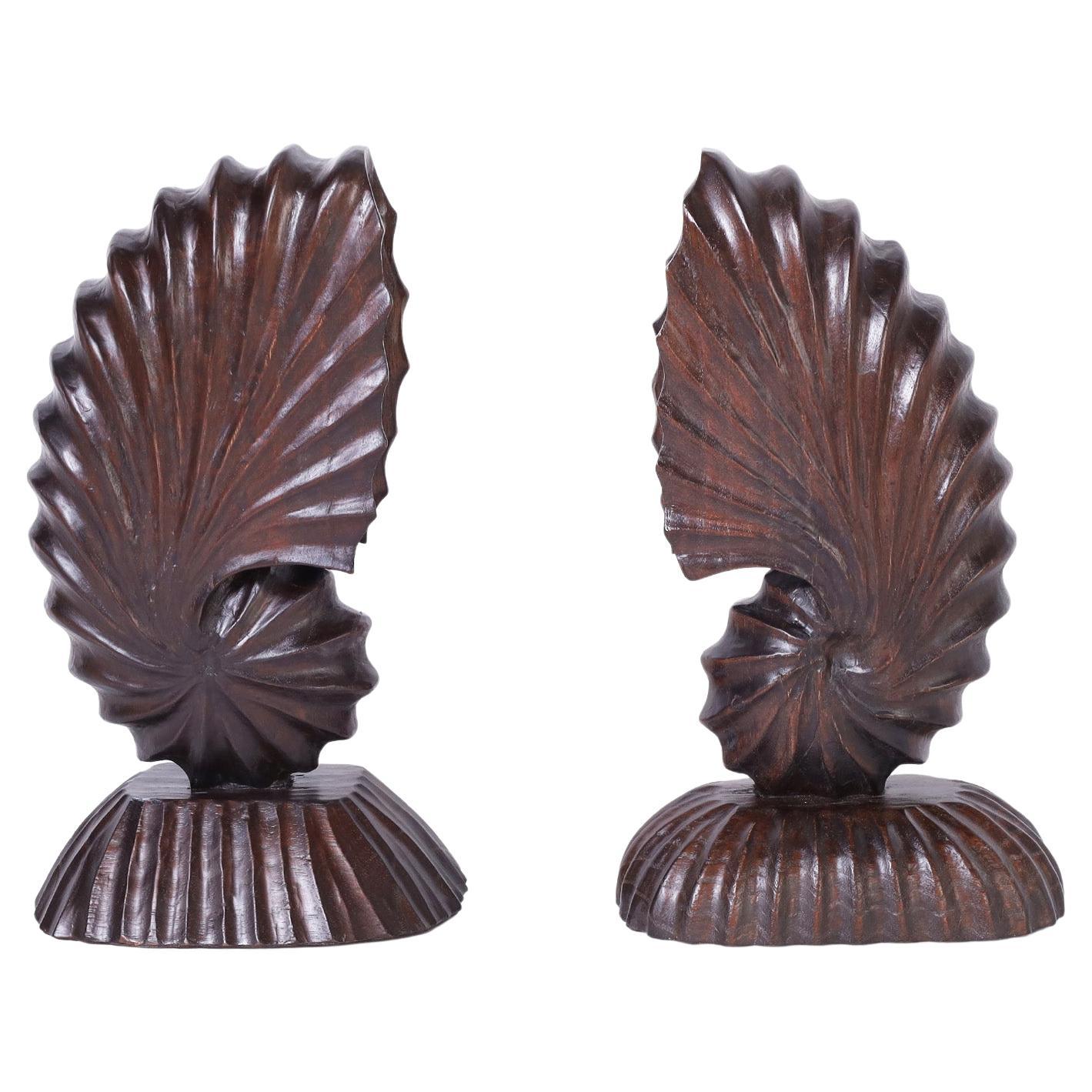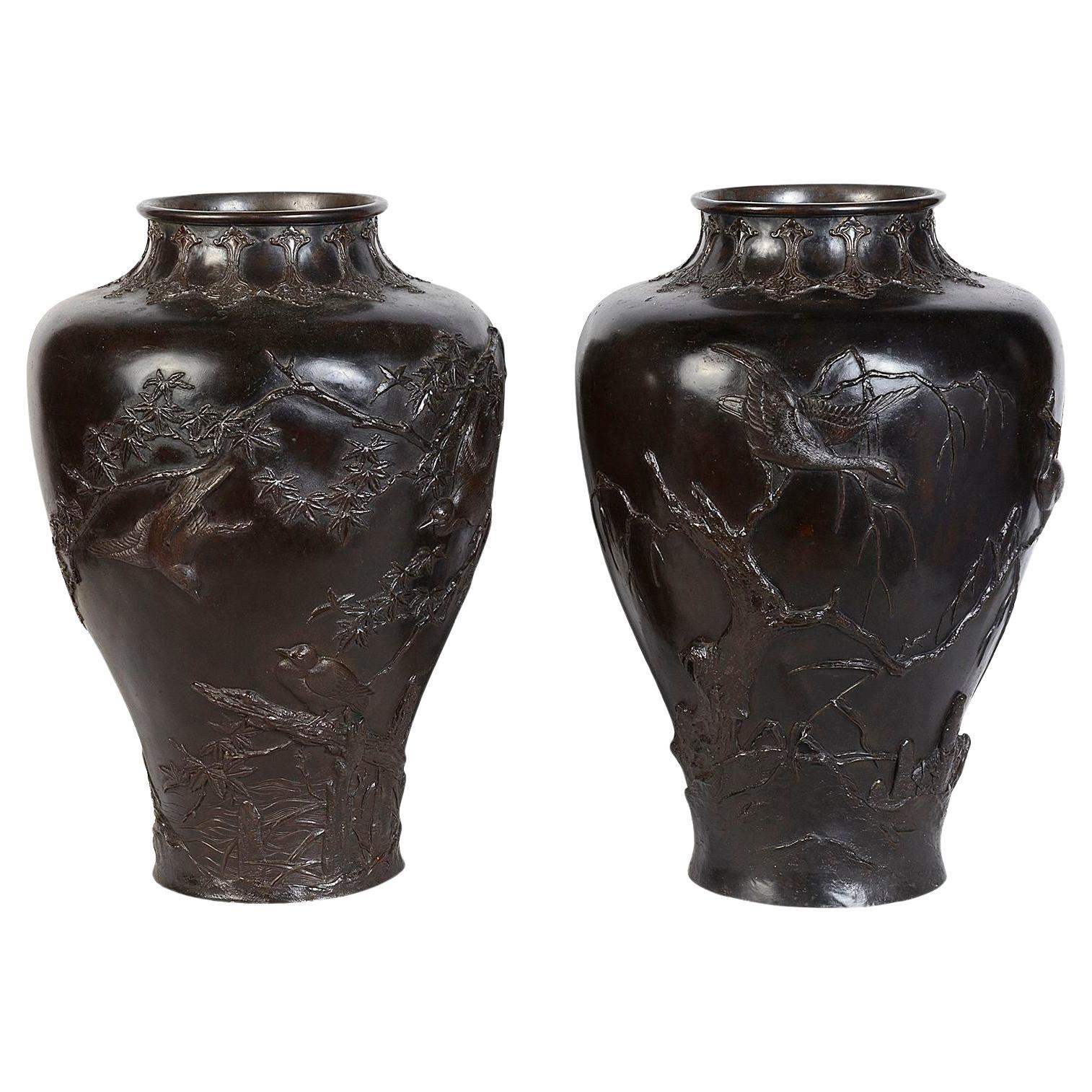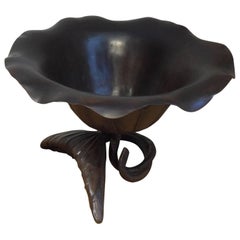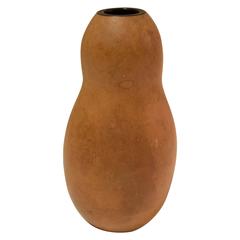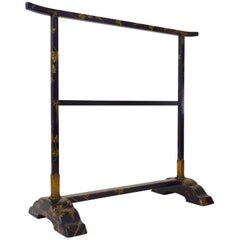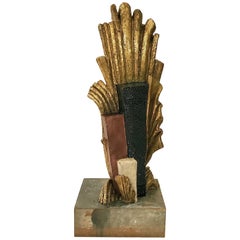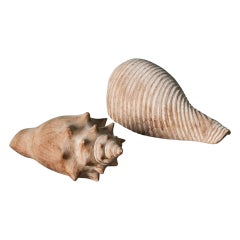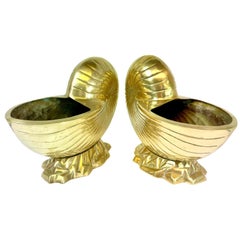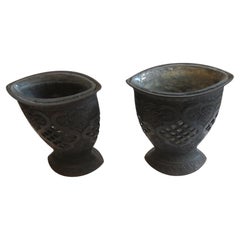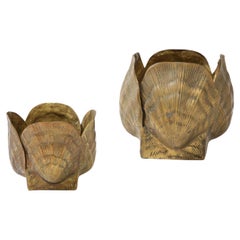Items Similar to Two Japanese Bronze Shells
Want more images or videos?
Request additional images or videos from the seller
1 of 7
Two Japanese Bronze Shells
$9,000per set
£6,809.12per set
€7,858.78per set
CA$12,570.50per set
A$13,975.99per set
CHF 7,315.59per set
MX$171,410.89per set
NOK 93,145.93per set
SEK 87,940.80per set
DKK 58,644.78per set
Shipping
Retrieving quote...The 1stDibs Promise:
Authenticity Guarantee,
Money-Back Guarantee,
24-Hour Cancellation
About the Item
These charming bronze shells were cast in Japan in the 19th century. They lived for many years in the collection of the Paris artist Pierre Le-Tan. One of the shells is a lidded box in the form of an abalone (3 3/4" wide). Inside, it has a mottled-green patination that replicates the mother-of-pearl lining found in natural specimens. The other shell is a dolphin snail (2" high). When turned upside down, it sits on stubby spikes to serve as a small cup. Both the abalone and the dolphin snail are found off the coasts of Japan, an island nation surrounded by the Sea of Japan, the East China Sea, the Philippine Sea, and the Pacific Ocean.
The Japanese have always been keen observers of nature. This is not unconnected to their indigenous religion of Shinto, which is based on the principle that spirits, or kami, inhabit all things in nature. This predisposed the Japanese to collect natural specimens, like rocks and shells, which they prized for the beauty of their forms. Not surprisingly, the most important collection of shells in the world is said to have been formed by the Japanese emperors. One particularly rare one is called the emperor’s shell, because, whenever a fisherman found one, he was obliged to surrender it to the ruler. In Europe, from the 16th to the 18th century, shells were also collected by kings, aristocrats, and learned men, who incorporated them in their cabinets of curiosities. Only in Japan, however, did collectors convene to contemplate them one by one. In an exercise of poetic free association, each participant compared a shell’s form to that of something else — perhaps a cloud, dragon, bird, or feminine hairstyle.
- Dimensions:Height: 2 in (5.08 cm)Diameter: 3.75 in (9.53 cm)
- Sold As:Set of 2
- Style:Edo (Of the Period)
- Materials and Techniques:
- Place of Origin:
- Period:
- Date of Manufacture:circa 1850
- Condition:Wear consistent with age and use.
- Seller Location:New York, NY
- Reference Number:1stDibs: LU1061426168982
About the Seller
5.0
Recognized Seller
These prestigious sellers are industry leaders and represent the highest echelon for item quality and design.
Established in 1994
1stDibs seller since 2014
20 sales on 1stDibs
- ShippingRetrieving quote...Shipping from: New York, NY
- Return Policy
Authenticity Guarantee
In the unlikely event there’s an issue with an item’s authenticity, contact us within 1 year for a full refund. DetailsMoney-Back Guarantee
If your item is not as described, is damaged in transit, or does not arrive, contact us within 7 days for a full refund. Details24-Hour Cancellation
You have a 24-hour grace period in which to reconsider your purchase, with no questions asked.Vetted Professional Sellers
Our world-class sellers must adhere to strict standards for service and quality, maintaining the integrity of our listings.Price-Match Guarantee
If you find that a seller listed the same item for a lower price elsewhere, we’ll match it.Trusted Global Delivery
Our best-in-class carrier network provides specialized shipping options worldwide, including custom delivery.More From This Seller
View AllJohn Bradstreet Bronze Lotus, circa 1900
By John Scott Bradstreet
Located in New York, NY
From the 1890s until his death in 1914, John Bradstreet, the important American Arts and Crafts furniture and interior designer, worked from The Crafts House, his landscaped orientalist compound in Downtown Minneapolis. There, he also received his clients, and dealt in Asian art acquired on frequent trips to the Far East. He used similar bronze Japanese lotuses...
Category
Antique Early 1900s American Arts and Crafts Garden Ornaments
Materials
Bronze
Japanese Scholar's Object
Located in New York, NY
This natural gourd was sliced at the top, hollowed out, and lacquered in black inside, around the rim, and on the bottom where it was signed by the artisan with Chinese and Japanese ...
Category
Early 20th Century Japanese Organic Modern Vases
Materials
Lacquer
Elegant Japanese Edo Period Rack
Located in New York, NY
This refined object dates to the first half of the 19th century, and was probably used for obi, kimono sashes, which were hung over it. The gold decorations on the black-lacquered g...
Category
Antique 1830s Japanese Edo Lacquer
Materials
Lacquer
1920s Swedish Grace Sculpture
Located in New York, NY
This abstract 1920s Swedish sculpture of painted-and-gilded plaster, on a painted-wood base, is pleasing from all angles. At the time and place where it...
Category
Vintage 1920s Swedish Modern Abstract Sculptures
Materials
Plaster, Wood
Set of 12 Porcelain Shells by Giovanni Garibaldi for Richard-Ginori
By Giovanni Gariboldi
Located in New York, NY
In the 1920s Gio Ponti, who defined 20th century Italian design, was the art director of Richard-Ginori, a venerable porcelain company established in the 18th century. When Ponti moved on in 1930, his protégé Giovanni Gariboldi, who also designed furniture and interiors, filled the vacated position. It would seem that Gariboldi found his model for these shell-shaped dishes in nature, but this is not the case. Rather, he channeled the essence of “shellness," and endowed his design with the faux verisimilitude of delicate ribbing along the scalloped edge. Yet he had them glazed in improbable candy-like pastel colors of pink, yellow, and blue. Originally used principally as ashtrays, no doubt, they could also be put to use as serving dishes for nuts and candies, or as decorative tabletop objects...
Category
Vintage 1940s Italian Modern Natural Specimens
Materials
Porcelain
Kitsune from the Edo Period
Located in New York, NY
According to Japanese folklore the fox, or kitsune, can assume human form to protect and trick humble country folk. Dating to the 18th century, this fox protects its own pup. Carved ...
Category
Antique 18th Century Japanese Sculptures and Carvings
Materials
Wood
You May Also Like
Pair of 20th Century Carved Hardwood Seashells
Located in Wormelow, Herefordshire
A superb pair of large antique carved hardwood seashells.
In an impressive scale, these wooden decorative pieces are depictions of a conch (left) and fig shell (right), showcasi...
Category
20th Century Mid-Century Modern Sculptures and Carvings
Materials
Wood, Hardwood
Large Pair of Brass Seashell Nautilus
Located in New York, NY
Large brass nautilus from the 1970s n a hand polished finish, circa 1970s. Made in Korea. Both are same size, shape, and color.
Category
Late 20th Century Korean Hollywood Regency Animal Sculptures
Materials
Brass
$1,295 / set
Magnificent Estate Pair Asian Japanese / Chinese Bronze Centerpiece Urns Vases
Located in New York, NY
The Following Item we are offering is A Magnificent Large Pair of Beautiful Exquisite Original Estate Bronze and Glass Asian Centerpiece Vases. Beautifully done with Fine Ornate Bron...
Category
20th Century Asian Antiquities
Materials
Bronze
$1,800 Sale Price
60% Off
Free Shipping
Pair Duquette Style Shell Planters
By Tony Duquette
Located in New York, NY
Mid Century Modern pair of stylized bronze shell jardinieres, in the style of Tony Duquette.
Larger : 8.5T X 7W X 7D
Smaller : 5.25T X 6W x6D
Category
20th Century American Mid-Century Modern Planters, Cachepots and Jardini...
Materials
Bronze
$1,600 / set
Pair of Carved Wood Nautilus Shells
Located in Palm Beach, FL
Mid-century nautilus sculptures or objects of art carved from mahogany in a stylized form with a dark lush finish.
Category
20th Century Italian Mid-Century Modern Figurative Sculptures
Materials
Hardwood
$3,600 / set
Pair Meiji period Japanese bronze vases, 19th century
Located in Brighton, Sussex
A striking pair of late 19th Century (Meiji period, 1868-1912) Japanese patinated bronze vases, each with relief decoration depicting flying among trees.
We can have these vases conv...
Category
Antique 19th Century Japanese Vases
Materials
Bronze
More Ways To Browse
Dragon Cabinet
3 Dolphins
Green Chinese Cabinet
Sea Shell Bronze
Antique Sea Shell Art
Chinese Fisherman
Dragon Cup
Japanese Mother Of Pearl Art
Japanned Cabinet 18th Century
Chinese Bronze Box
Sea Shell Box
Chinese Cabinet Birds
Chinese Dragon Box
16th Century Cast Bronze
Japanese Pearl Of Mother Box
Sea Snail
Japanese Fisherman
Bronze Snail
